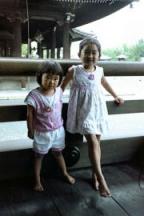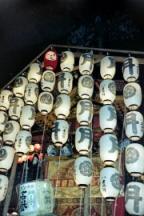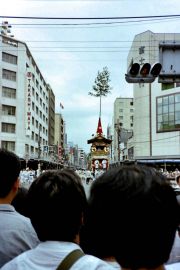|
Kyoto was the highlight of my three weeks spent traveling through Japan. A three hour trip by Shinkansen (Bullet Train) from the hustle, bustle and endless concrete of Tokyo, Kyoto moves at a slower pace and gives one a better sense of Japanese art, architecture and culture. Kyoto is compact enough that a short taxi ride takes you from the thriving city center to lushly wooded hills and scenic walking trails. Kyoto is known for its Gion District, where young apprentice maiko are schooled in the arts of the geisha. Kyoto offers a wealth of Buddhist temples, Shinto shrines and classical Japanese gardens. A lot of my touring of Kyoto was on foot, which allowed me to explore the quaint neighborhoods and backroads that most tourist would by-pass, and discover nice surprises like small shrines and gardens not found in any tour book. Despite being a modern and sizeable city (definitely more so since July of 1987…), the city has a very traditional feeling, given that a lot of the original wooden temples, shrines and old buildings remained intact through World War II due to a gentlemen’s agreement that Kyoto would be spared Allied aerial bombardment in exchange for Allied aircraft being spared Triple-A fire as they over flew the historic city flanked by lush hills and mountains. [Update 19 November 2011 - I was able to find some old negatives from my Japan trip in the garage and scan some to add to this report; I've also added some addition information.]
|
|
| Favourite spots: |
|
In the Higashiyama (East Mountain) District, I did a nice walk along Gojo-Dori from the Kamo River East to Kiyomizu Temple, which has a high wooden veranda from which to view the city, and follow the East foothills North to Chion-In Temple and Heian Shrine, and then down through the Gion District along Shijo-Dori and then along the scenic Shirakawa Creek which parallels the Kamo River. I was lucky in that the Gion Matsuri festival (late July) was being celebrated, with a parade of large elaborate floats, dancers and musicians.
|
|
| What's really great: |
 |
 |
 |
 |
 |
 |
 |
 |
Cute kids at Higashi Honga-Ji Temple.
 |
 |
Through an ad posted on the board at the Kyoto Tourist Information Center, I met an elementary school teach (Kikuko)and her class of Japanese kids (ages 5 through about 10) who were studying English at a special English Party; they wanted the kids to be able to practice their skills with native English speakers. It was cute because this one girl of about 5 years old was staring at me with apprehension for the longest time as I sat on the ground and tried to break the ice with her. She finally got up the nerve to reach through my open collar and tug at my chest hair, which she had never seen before. She was shocked to find out that it was real, which prompted a lot of laughter from all the kids and a lot more curious tugs! I then officiated over a team event of pass the yen with chop sticks while the teacher shouts "Ichi-Ni! (clap-clap) Ichi-Ni!" It made for a fun afternoon, though I unfortunately forgot my camera when I was picked up from my ryokan!
|
|
| Sights: |
|
Nijo Castle, Sanjusangen-Do (a long hall with 1003 Buddha images), Kyoto Tower, Toji Temple (I believe it's the tallest five-level pagoda in Japan), Higashi Honga-Ji Temple, Chion-in Temple, the Nanzen-ji aqueduct and the Handicrafts Center in Gion on Shijo-Dori. Take a walk along the east foothills (Higashyama district) starting near Kiyomizu Temple and head north to check out the natural scenery and a number of temples and small shrines missed by most tourists. What I missed (...but you should not) would be the Kinkakuji 'Temple of the Golden Pavilion' (closed when I was there because of a labor strike), the Moss Temple and the zen rock garden at Ryoanji. If you're in Kyoto in July, check out the Gion Matsuri festival (July 16 and 17). The festival began in the 9th Century when the priests of Yasaka Shrine organized the residents to accompany huge shrine wagons meant to appease the gods and lift a plague that infected the city at the time.
|
|
| Accommodations: |
|
I stayed at the Ryokan Ichume, which was not stellar but was comfortable and had character (Kikuko told me the neighborhood used to be a Yakuza area, and that my ryokan used to be a house of prostitution (How's that for character?!) The owner was very nice, and the price was only 2000 Yen a night; there was no breakfast, but always plenty of hot green tea. It's located South of Gojo-Dori on the small street that runs parallel to the Kamo River. One challenging aspect of the stay was that the caretaker’s wife was suffering from either dementia or some other mental ailment which would sometimes cause her to start talking very loudly to herself (sometimes late at night or early in the morning), screaming out, or starting to softly sing some Japanese folk song which would soon raise in volume until she was more melodically yelling than singing, which would usually end in a blood-curdling scream. The school teacher that I met told me that she thought that the ryokan was once a brothel.
|
|
| Nightlife: |
 |
 |
 |
 |
 |
 |
 |
 |
Ceremonial wagons on display along Shijo-Dori the night before Kyoto's Gion Matsuri festival.
 |
 |
The Kyoto nightlife has likely changed a lot since I was there. There were quite a few hostess bars and other drinking establishments along the streets that run immediately parallel to the Kamo River between Gojo-Dori and Shijo-Dori. About midway along the stream between Gojo-Dori and Shijo-Dori, there was a photogenic arched footbridge that spanned the stream, and for some reason I would often see the same group of women in high-heels and cocktail-type dresses sitting on the bridge and chatting as they smoked cigarettes. At first I thought that perhaps they were girls from one of the local hostess bars that always just happened to be taking an evening break when I walked by, but thinking back to what Kikuko had told me about the area, I figured that they were probably local prostitutes. Recalling the famous song by rock/blues guitarist legend Robin Trower, I started referring to that bridge as the “Bridges of Sighs…and Grunts, and Moaning”.
|
|
| Restaurants: |
 |
 |
 |
 |
 |
 |
 |
 |
Shrine wagons on parade at Kyoto's Gion Matsuri festival in July.
 |
 |
The best (and cheapest) way to go is to stick with the small family-run restaurants with only about six or so tables and avoid the hotel restaurants and really fancy places.
|
|
| Other recommendations: |
|
Take a trip due south of Kyoto to tour the Todaiji Temple and garden in Nara. Nara's Todaiji Temple, a UNESCO World Heritage site; Nara is about 45 minutes by bus from Kyoto, and was visited as a half-day tour arranged through one of the hotels near Kyoto Station. The large building in the background (claimed by the Japanese government to be the largest wooden structure in the world) is the Daibutsuden, the main hall of Todaiji Temple which houses the Daibutsu ('Great Buddha') statue, which is the largest bronze casting in the world. Unforunately, the interior of the Daibutsuden was too dark for me to get any decent picture of the Daibutsu statue. Todaiji temple features a garden with a large assortment of photogenic old moss-covered lanterns, and some rather tame deer that are always looking for handouts in the form of 'deer cakes' that are offered for sale.
|
|
Published on Tuesday June 25th, 2002
|
|
 Publish on Facebook
Publish on Facebook
|
Tue, Oct 21 2008 - 02:20 AM
 by mistybleu
| A thoroughly enjoyable read, loved the story of the school children |
Thu, Apr 17 2003 - 10:38 PM
 by downundergal by downundergal
Hi there,
I had a chuckle reading your report. It's always the normal everday "un-touristy" happenings that make a place more memorable.
Japan is definately on my travel list.
Cheers,
Kerrie |
Fri, Apr 11 2003 - 03:15 AM
 by andreas by andreas
Thanx for your great reports on Japan. I am planing to visit this great country for so long. Your recommendations on the accoumodations sound really good, since I believe Japan is really expenisive and it is difficult to find cheep places to stay.
Have fun travelling!
Andy |
| Information: |
| Login if you are a member, or sign up for a free membership to rate this report and to earn globo points! |
|
| Indonesia |
|
|
 |
| Japan |
|
|
|
|
|
|
|
|
 |
| Laos |
|
|
|
|
|
|
|
|
|
|
 |
| Malaysia |
|
|
 |
| Mexico |
|
|
 |
| Netherlands |
|
|
 |
| Singapore |
|
|
|
|
|

|
